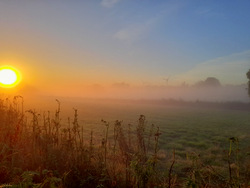 A change of season is always seen in Chinese medicine, as a challenge to the body, and a time when we should take care to adjust our lifestyle and habits. We have experienced only a hint of autumn in what has so far been a beautiful and warm start to September, with just gently yellowing trees and morning mist. The 23rd of the month marks the equinox, toadstools are appearing on our lawns and spider webs await the first person of the day to walk by. This is the season which can lull us into a false sense of security with its mellow abundance. But as dew turns to frost, we realise by November we have been led gently to the gate of winter, and the scales have tipped in favour of the dark and the Yin.
A change of season is always seen in Chinese medicine, as a challenge to the body, and a time when we should take care to adjust our lifestyle and habits. We have experienced only a hint of autumn in what has so far been a beautiful and warm start to September, with just gently yellowing trees and morning mist. The 23rd of the month marks the equinox, toadstools are appearing on our lawns and spider webs await the first person of the day to walk by. This is the season which can lull us into a false sense of security with its mellow abundance. But as dew turns to frost, we realise by November we have been led gently to the gate of winter, and the scales have tipped in favour of the dark and the Yin.
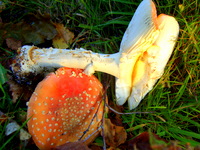 This year, we enjoyed a cool, wet July and August, so you might be going into the autumn feeling your batteries and vitamin D levels haven’t been topped up. Especially if that’s the case, it’s now worth paying particular attention to our health, because this will stand us in good stead through the next five months.
This year, we enjoyed a cool, wet July and August, so you might be going into the autumn feeling your batteries and vitamin D levels haven’t been topped up. Especially if that’s the case, it’s now worth paying particular attention to our health, because this will stand us in good stead through the next five months.
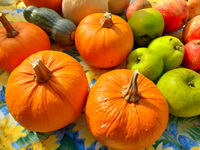 Looking firstly at diet, we can begin a tilt in favour of more warm, cooked foods: porridge for breakfast is an excellent start to the day. Cut back on the salads, replacing them with what nature in September and October is prompting us to use instead: how about a hot pumpkin pie, a root vegetable soup, or baked apples with a sprinkling of cinnamon and nutmeg? If in doubt over diet, just ask yourself whether it is locally grown in Devon and in season. If the answer is yes, then from a Chinese medical perspective, you are unlikely to go far wrong.
Looking firstly at diet, we can begin a tilt in favour of more warm, cooked foods: porridge for breakfast is an excellent start to the day. Cut back on the salads, replacing them with what nature in September and October is prompting us to use instead: how about a hot pumpkin pie, a root vegetable soup, or baked apples with a sprinkling of cinnamon and nutmeg? If in doubt over diet, just ask yourself whether it is locally grown in Devon and in season. If the answer is yes, then from a Chinese medical perspective, you are unlikely to go far wrong.
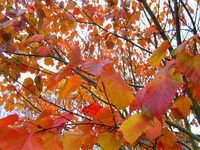 Next, there is dress. In early autumn, to encourage gradual adaptation of the body to the cold which lies in wait in the months ahead, do not put on too many warm clothes too soon. Equally important at this point in the year, is the taking of plenty of outdoor exercise. The Chinese divide autumn into six so-called solar terms, to which we can readily relate by virtue of their simple, descriptive titles: beginning of autumn, limit of heat, white dew, autumn equinox, cold dew, frost’s descent. You can gradually adjust your clothing according to which stage you feel we have progressed to.
Next, there is dress. In early autumn, to encourage gradual adaptation of the body to the cold which lies in wait in the months ahead, do not put on too many warm clothes too soon. Equally important at this point in the year, is the taking of plenty of outdoor exercise. The Chinese divide autumn into six so-called solar terms, to which we can readily relate by virtue of their simple, descriptive titles: beginning of autumn, limit of heat, white dew, autumn equinox, cold dew, frost’s descent. You can gradually adjust your clothing according to which stage you feel we have progressed to.
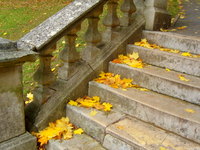 Turning to sleep, traditional teachings recommend we adjust our bedtime to remain in harmony with the rhythms of nature: in autumn, we can continue to rise early, as is the recommendation in summer, but we should now try to retire earlier in the evening.
Turning to sleep, traditional teachings recommend we adjust our bedtime to remain in harmony with the rhythms of nature: in autumn, we can continue to rise early, as is the recommendation in summer, but we should now try to retire earlier in the evening.
 Finally, if the lower light levels on overcast days plus the now ever-shortening length of the day, conspire to lower your mood, then I can offer two recommendations: one is, if you have to be indoors, to locate yourself right in front of a window; the other is to take a thirty minute walk in the fresh air daily. The latter could be a lunchtime stroll if you are normally confined to an office all day. These measures will dramatically increase the light levels you are exposed to, and combined with fresh air, will help you to feel better. In addition, the beautiful autumn colours which the trees hopefully have in store for us over the next month, will provide food for your soul.
Finally, if the lower light levels on overcast days plus the now ever-shortening length of the day, conspire to lower your mood, then I can offer two recommendations: one is, if you have to be indoors, to locate yourself right in front of a window; the other is to take a thirty minute walk in the fresh air daily. The latter could be a lunchtime stroll if you are normally confined to an office all day. These measures will dramatically increase the light levels you are exposed to, and combined with fresh air, will help you to feel better. In addition, the beautiful autumn colours which the trees hopefully have in store for us over the next month, will provide food for your soul.
